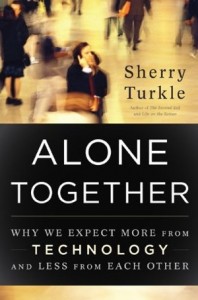Alone Together
 M.I.T. professor Sherry Turkle has written two previous books on the subject of technology and its effects on humanity. Apparently The Second Self, published 26 years ago, presents a more sunny thesis that online exploration is beneficial to self-development. But Turkle’s new book, Alone Together, is a fascinating and at times devastating exploration of the question posed in its subtitle: “Why We Expect More from Technology and Less from Each Other.”
M.I.T. professor Sherry Turkle has written two previous books on the subject of technology and its effects on humanity. Apparently The Second Self, published 26 years ago, presents a more sunny thesis that online exploration is beneficial to self-development. But Turkle’s new book, Alone Together, is a fascinating and at times devastating exploration of the question posed in its subtitle: “Why We Expect More from Technology and Less from Each Other.”
The first half of the book describes our interaction with robots: robotic toys like furbies and My Real Baby; robotic animals like AIBO the dog and Paro the seal, given for therapeutic purposes to Alzheimer’s patients; and more sophisticated robots like the interactive ones developed with an eye toward human companionship. It was news to me that for the more repetitive tasks of childcare and elder care, such robots are being developed and refined. Sherry Turkle interviews a wide variety of people, from children to older adults, and studies their interaction with these machines.
This was intermittently interesting to me, but as I have not had much (or any) experience with robotic toys, either for myself or my children, I didn’t really see where it was going till I got into the second half of the book. For what it’s worth, Turkle seems to come down where I do on the subject of robotic companions for children and the elderly, the most vulnerable among us. She writes,
We know that the time we spend caring for children, doing the most basic things for them, lays down a crucial substrate. On this ground, children become confident that they are loved no matter what. And we who care for them become confirmed in our capacity to love and care. The ill and elderly also deserve to be confirmed in this same sense of basic trust. As we provide, we become more fully human.
The second half of the book, where Turkle makes the jump to the machine-mediated relationships of the Net, interested me the most. It focuses on the behavior and experiences of the generation that grew up with toys that talk back and parents who multitask with their electronic devices. For the most part it’s a sad story of people turning to computers — Facebook, texting, email, online games and confessional sites — because they supply a level of interaction that’s better than nothing. But eventually, the majority come to the belief that they are simply better. Better than flesh and blood real people. Better than real-time interruptions like the telephone. At least that’s the perception. But whatever the definition of “better” (in general it seems to mean merely “convenient”), it fails to satisfy. We are made for relationship; we need solitude and privacy to develop as individuals and as social beings; we are drawn to technology to lighten our load and find ourselves bearing stresses caused by the machines that were supposed to help us. “It is poignant that people’s thoughts turn to technology when they imagine ways to deal with stresses that they see as having been brought on by technology,” writes Turkle.
It’s not fashionable to think the Net is insidious. It’s understood that in any conversation about technology, we’re supposed to begin with, “I’m not anti-technology,” or “Facebook isn’t evil (knowing chuckle),” or “I’m no Luddite.” But most of us are aware of some troubling aspects of the technology explosion of recent years: lack of privacy, superficiality of relationship and of thought, narcissism. There is a seductive pull that’s hard to resist. Turkle doesn’t like the word “addiction,” in the same way that the doctor who helped me years ago when I was treated for bulimia would not apply the word to eating disorders. An addiction can’t be broken except by quitting whatever the addictive substance is. But in the same way the person with the eating disorder needs food to survive, the internet has become a pretty much necessary part of modern life — in politics, economics, the labor force, the academic world. It’s not going away.
So Turkle ends on a cautiously optimistic note. In the book’s concluding section, she urges us not to set up false alternatives like, “Either I’m on Facebook or I have no social life,” or “I have to either unplug completely or watch more and more of my life swirl down the drain of technological demand.” She calls this “quandary thinking,” and quotes Kwame Anthony Appiah’s Experiments in Ethics:
In the real world, the act of framing — the act of describing a situation and thus of determining that there’s a decision to be made — is itself a moral task. It’s often the moral task. Learning how to recognize what is and isn’t an option is part of our ethical development… In life, the challenge is not so much to figure out how best to play the game; the challenge is to figure out what game you’re playing.
What game are we playing with our machine-mediated relationships? Turkle reminds us that we haven’t been playing it very long, and there is time to stop and think about how we can restructure it to better preserve our humanity and nourish those we love. “We don’t need to reject or disparage technology,” she writes. “We need to put it in its place.”
I found this to be engaging and readable, as well as very sobering. A few of the reviews I’ve read contend that the evidence is largely anecdotal, but I am mystified by the claim. Numerous studies and interviews are cited, research conducted with various subjects at MIT as well as enough anecdotal illustration to keep the book readable for a layperson. Where Nicholas Carr’s book focuses on how the internet affects brain behavior, Turkle examines how the widespread use of social gadgets and robots affects human relationships, and the level of insight and analysis she provides casts a helpful searchlight on the subject.
Some of it is horrifying… In the end, I still can’t make up my mind whether computers dehumanize us, or whether they simply magnify and exaggerate human nature with all its flaws — of which extreme self-centeredness has always ranked pretty high. Either way, this book has been illuminating to me, and if it does occasionally horrify, it motivates as well. My online commitments are relatively light, consisting of only this blog and email. But since I started reading Alone Together, I’ve been doubly aware of my screen time, and doubly conscious of how easy it is to divide my attention when the people I care about need all of it. This is a step toward a more proactive, and less self-defeatingly frustrated, response to the whole “quandary.”
I’ve read a fair amount on this subject over the last year or two: Neil Postman’s Amusing Ourselves to Death and Technopoly, Sven Birkerts’ Gutenberg Elegies, Nicholas Carr’s The Shallows, Jesse Rice’s Church of Facebook, and before all of it, Wendell Berry’s canon. But this book is what I’ve been most hungry for — a sharply focused look at the interaction between our humanity and our technology. I’ve given only the most cursory summary of it here, but it’s hard to imagine anyone for whom Alone Together would not be a worthwhile read.



5 Comments
Carrie, Reading to Know
I had no idea that there are so many books talking about technology out there. You’d think we’d eventually start to sit up and take notice, wouldn’t you?
Carol in Oregon
Janet, this book just recently went on my TBR list. One of my former pastor’s recommended it to me. His assessment was very similar to yours: first part of the book was marginally interesting, but the second half was fascinating.
I’ve also read much of Wendell Berry and most of Neil Postman. This reviews was *very* helpful. Thank you!
Carol in Oregon
Delete One of my former pastor’s and put in ~ A former pastor friend ~ argh!!
Janet
Carol, I’ll look forward to seeing what you think of it! It’s the kind of book I wished I could talk to someone about as I was reading it.
Carol in Oregon
Janet, wanting to talk to someone about a book I’m reading is a common experience.